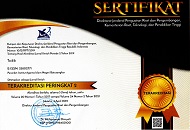THE EFFECT OF PROBLEM-BASED LEARNING MODEL IN INFORMATION TECHNOLOGY INTERVENTION ON COMMUNICATION SKILLS
Abstract
Communication skills need to be improved during learning. However, the learning process in schools has not fully implemented learning models that can improve students' communication skills. Learning in schools is still teacher-centered, lack of use of Information Technology (IT), students’ inactivity, and their lack of interest in learning in class. The solution is to apply the PBL learning model in IT interventions. The research objective was to develop students' communication skills. The instrument used is was a rubric to assess communication that had been validated by experts. The research design was Randomized Control Group Posttest Only Design. This type of research is a quasi-experimental. The data were analyzed by using the two-way ANOVA test. The results showed that there was a significant difference between the PBL learning model and the information technology intervention on the communication skills of students with an average score of 64.27% in the experimental class and 57.70% in the control class and a significant value of 0.00
Keywords
Full Text:
PDF (English)References
Alberida, H., Lufri, L., & Berlian, F. (2018). Problem Solving Model for Science Learning. IOP Conference Series: Materials Sciences and Engineering, 335(1).
Asemanyi, A. A. (2015). An Assessment of Students’ Performance in Communication Skills: A Case Study of the University of Education Winneba. Journal of Education and Practice, 6(35), 1–7.
Aydin, A. D. (2015). Assessment of Communication Skills of Physical Education and Sport Students in Turkish Universities. Universal Journal of Educational Research, 3(11), 943–948.
Iftitahurrahimah, I. (2020). Pengaruh Model Problem Based Learning (PBL) terhadap Kemampuan Komunikasi Siswa Materi Pokok Larutan Elektrolit dan Non-Elektrolit. Jurnal Pijar MIPA, 15(1).
Iswan, H. (2018). Penguatan Pendidikan Karakter Perspektif Islam dalam Era Milenial IR. 4.0. Jurnal Pendidikan.
Kemendikbud. (2018). Modul Pelatihan Implementasi Kurikulum 2013. Badan Pengembangan Sumber Daya Manusia Pendidikan dan Budaya dan Penjamin Mutu Pendidikan.
Khan, A., Khan, S., & Khan, M. (2017). Communication Skills of a Teacher and Its Role in the Development of the Students’ Academic Success. 8(1), 18–21.
Kodariyati, L., & Astuti, B. (2016). Pengaruh model PBL terhadap kemampuan komunikasi dan pemecah masalah matematika siswa kelas V SD. Jurnal Prima Edukasia, 4(1), 93–106.
Lufri, & Ardi. (2007). Metodologi Penelitian: Penelitian Kuantitatif, PTK dan Penelitian Pengembangan. Padang: UNP Press Padang.
Lufri, L., Fitri, R., & Yogica, R. (2018).
Effectiveness of Concept-Based Learning Model, Drawing and Drill Methods to Improve Students’ Ability to Understand Concepts and High-Level Thinking in Animal Devlopment Course. Journal of Physics: Conference Series, 11(6).
Rangkuti, A. N., & Fitriani, F. (2019). Pengaruh Pendekatan Pembelajaran PBL dan PjBL terhadap Kemampuan Komunikasi Matematis Mahasiswa pada Mata Kuliah Statistik. Ta’dib, 22(2).
Septiani, V., Syamsurizal, & Darussyamsu, R. (2018). Peningkatan Kompetensi Keterampian Peserta Didik dengan Model Penerapan Strategi Learning Community melalui Model Pembelajaran Jigsaw pada Materi Sistem Penceraan Manusia Kelas VIII di SMPN 12 Padang. Journal Bioeducation, 1(2).
Taryono, T. (2016). Penerapan Pembelajaran Berbasis Proyek dan Pembelajaran Berbasis Masalah pada Mata Pelajaran Fisika untuk Meningkatkan Keterampilan Abad 21 (4Cs) Siswa SMP. Retrieved from repository.upi.edu
Zulhilyah. (2013). Pengaruh Metode Pembelajaran Creative Problem Solving terhadap Keterampilan Berpikir Kreatif dan Komunikasi dalam Pembelajaran IPS. Retrieved from repositori.upi.edu
DOI: http://dx.doi.org/10.31958/jt.v24i1.2456
Refbacks
- There are currently no refbacks.
Copyright (c) 2021 Lufri

This work is licensed under a Creative Commons Attribution-NonCommercial-NoDerivatives 4.0 International License.
TA'DIB with registered number e-ISSN: 2580-2771, p-ISSN: 1410-8208 have been indexed on:

Journal Ta'dib distribute under Lisensi Creative Commons Atribusi-NonKomersial 4.0 Internasional.
Contact us: Ta'dib; Address: FTIK, Universitas Islam Negeri Mahmud Yunus Batusangkar; Jl. Sudirman No. 137 Lima Kaum Batusangkar, Tanah Datar, Sumatera Barat, Indonesia. Email: takdib@uinmybatusangkar.ac.id

























